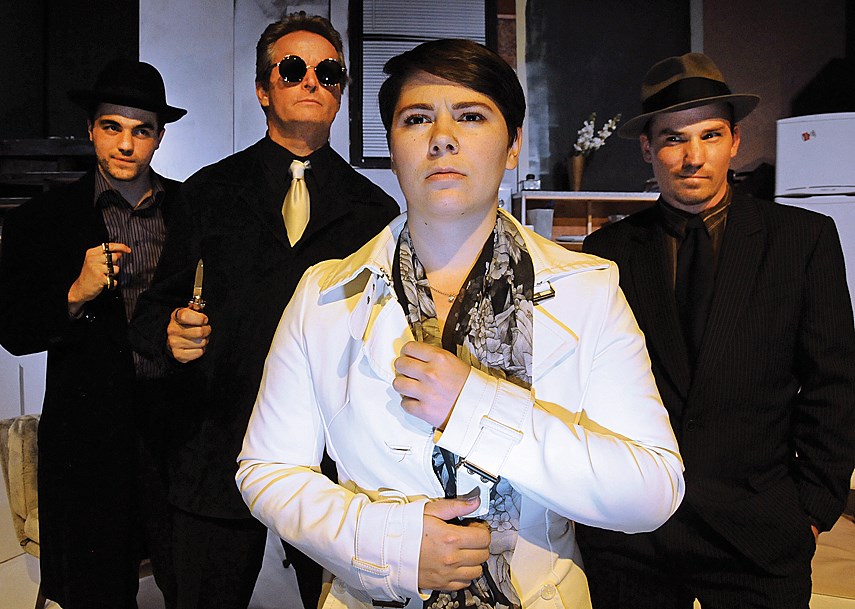Wait Until Dark by Frederick Knott, directed by Christopher Key, Deep Cove Shaw Theatre, until June 22. Tickets $20/$18, available online at deepcovestage.com or call 604-929-3200.
You can’t see. You’ll have to listen.
The drill goes quiet. The circular saw is silent. It’s the last night of rehearsal and, at the top of the unfinished set, timber framer Bruce Lindsay lets the door slap shut.
Squeeeeeal, thump-thump-thump.
The squeak is engineered by misaligning the hinges, Lindsay explains.
“Gives you the bump in the night,” he nods with satisfaction. “I told everybody: don’t oil the hinges.”
Those sounds are key to immersing the audience in the increasingly small, scary world inhabited Caitlin Hill as Susy Hendrix in Wait Until Dark.
“I still haven’t seen the movie,” Hill admits, referring to the 1967 Audrey Hepburn thriller. “I didn’t want to emulate [Hepburn] in my acting choices. I’m sure I could watch it now but I don’t really have much time before opening night.”
Written by Frederick Knott, Wait Until Dark centres on a newly blind Greenwich Village housewife hounded by lowlifes looking for a misplaced heroin stash.
As preparation, Hill blindfolded herself and counted steps in her apartment. On stage, she lets her eyes fall into a soft focus, an effective technique that leaves her with a nasty headache.
Hill can’t let the audience catch her looking despite the temptation to inspect the stage’s ramps and stairways “and things to trip on.”
The walls are also about 15 degrees out of true, she notes.
“Don’t blame that on me,” Lindsay protests. “This was by design.”
The set’s look is indebted to the 1920 German Expressionist horror movie The Cabinet of Dr. Caligari, explains director Christopher Key, pointing out the “cockeyed” door and unfriendly shadows.
As the cheaper crooks filter out of the story and Susy is left with the one truly menacing figure, the dwindling light and peculiar angles should ramp up the anxiety in the theatre, Key explains
Not wanting his actors to get hurt, Key had been content with the stage being dim. Caitlin, he says, asked for darkness.
“All the way dark?” he asked her.
She nodded.
The actor and director have been working together since Hill was a teenager in Bellingham, Wash. A shy child whose face would burn red at the first hint of public speaking, Hill took a voice lesson and heard herself hit a high F when was 13.
“I discovered this huge voice and huge person inside me,” she says.
It wasn’t long before Key cast Hill in her first musical, Damn Yankees.
A lover of musical theatre and a dual citizen, Hill moved to Vancouver to study opera at UBC.
Waiting for rehearsal at the Deep Cove theatre, Hill remembers being at UBC and ripping off a “highly stylized chicken costume” complete with pantaloons and a bonnet and donning a squirrel outfit in 20 seconds flat for The Cunning Little Vixen.
“I kind of needed a little break from the classical world,” she says.
Around the time she was wrapping up at UBC, Key arrived in Canada.
“Married a Canadian,” he says. “And I didn’t want to have anything to do with the U.S. anymore.”
After establishing his credentials in North Vancouver, Key got the chance to direct and immediately reached out to Hill.
She was already teaching drama in West Vancouver, working in Port Moody and running a “small, subversive” embroidery business, but she couldn’t miss the chance to play a courageous, resourceful heroine.
The last two scenes are emotionally gruelling, something Hill wasn’t sure how to deal with at first.
“How do I make sure that things that are traumatizing and triggering for Susy in this space don’t follow me home?” she wondered.
The solution, she found, is stepping off stage, breathing in and out, and giving a high five to her friend.
After she tags out she comes back to herself and Susy is left on stage.
As actors file in for rehearsal the stage is almost ready.
“It’s not about doing five things 50 per cent better,” Lindsay announces. “It’s all about doing 50 things five per cent better.”
Besides working on the set, Lindsay is also a sponsor of the Deep Cove Stage Society.
“I don’t get any business out of it, but that’s beside the point,” he says. “As a community person we need to support these volunteer groups because they’re wonderful training for young people.”
Everybody on set is a volunteer, Lindsay notes. “We do it because we love it,” he says, before turning his attention back to a hidey-hole on the stage.
Being on stage is like playing racquetball where the energy you send out comes flying back at you, Hill explains.
“I do a lot of projects . . . It’s Vancouver, so not all of them pay,” Hill says. “I would like to be a working artist in some capacity whether it’s acting, musicals, opera, burlesque, anything.”
The magic of theatre comes from letting go, Key says.
Key’s philosophy is to get the best actors and techies and “get the hell out of the way.”
As the lighting is finalized and the props are approved, Key readies to listen to one last rehearsal.
“I lost control of this show a long time ago,” he says happily.



